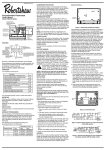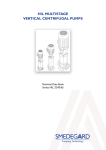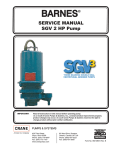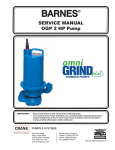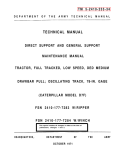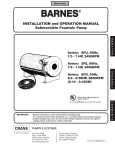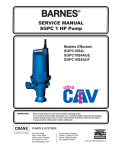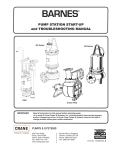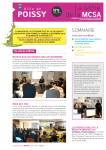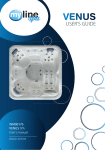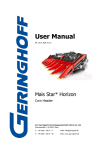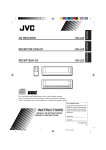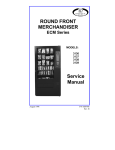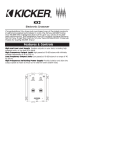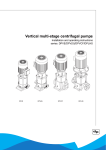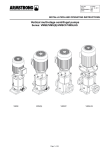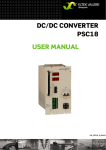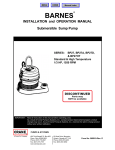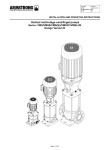Download vertical multi-stage
Transcript
Manual Index INSTALLATION AND OPERATION MANUAL BPV Pumps Series: BPV, BPV85, BPLHS IMPORTANT! A Crane Co. Company Read all instructions in this manual before operating pump. As a result of Crane Pumps & Systems, Inc., constant product improvement program, product changes may occur. As such Crane Pumps & Systems reserves the right to change product without prior written notification. 420 Third Street Piqua, Ohio 45356 Phone: (937) 778-8947 Fax: (937) 773-7157 www.cranepumps.com 83 West Drive, Bramton Ontario, Canada L6T 2J6 Phone: (905) 457-6223 Fax: (905) 457-2650 Form No. 127906-Rev. C SAFETY FIRST! Please Read This Before Installing Or Operating Pump. This information is provided for SAFETY and to PREVENT EQUIPMENT PROBLEMS. To help recognize this information, observe the following symbols: CAUTION ! Do not block or restrict discharge hose, as discharge hose may whip under pressure. IMPORTANT! Warning about hazards that can result in personal injury orIndicates factors concerned with assembly, installation, operation, or maintenance which could result in damage to the machine or equipment if ignored. WARNING ! Do not wear loose clothing that may become entangled in moving parts. WARNING ! Keep clear of suction and discharge openings. DO NOT insert fingers in pump with power connected. CAUTION! Warning about hazards that can or will cause minor personal injury or property damage if ignored. Used with symbols below. Always wear eye protection when working on pumps. WARNING! Warns about hazards that can or will cause serious personal injury, death, or major property damage if ignored. Used with symbols below. Hazardous fluids can cause fire or explosions, burnes or death could result. Biohazard can cause serious personal injury. Rotating machinery Amputation or severe laceration can result. Make sure lifting handles are securely fastened each time before lifting. DO NOT operate pump without safety devices in place. Always replace safety devices that have been removed during service or repair. Secure the pump in its operating position so it can not tip over, fall or slide. Extremely hot - Severe burns can occur on contact. Hazardous fluids under pressure, eruptions or explosions could cause personal injury or property damage. DO NOT exceed manufacturers recommendation for maximum performance, as this could cause the motor to overheat. Hazardous voltage can shock, burn or cause death. DO NOT remove cord and strain relief. DO NOT connect conduit to pump. Only qualified personnel should install, operate and repair pump. Any wiring of pumps should be performed by a qualified electrician. WARNING ! Cable should be protected at all times to avoid punctures, cut, bruises and abrasions. Inspect frequently. Never handle connected power cords with wet hands. WARNING ! To reduce risk of electrical shock, pumps and control panels must be properly grounded in accordance with the National Electric Code (NEC) or the Canadian Electrical Code (CEC) and all applicable state, province, local codes and ordinances. Improper grounding voids warranty. WARNING ! To reduce risk of electrical shock, all wiring and junction connections should be made per the NEC or CEC and applicable state or province and local codes. Requirements may vary depending on usage and location. WARNING! To reduce risk of electrical shock, always disconnect the pump from the power source before handling or servicing. Lock out power and tag. WARNING! Pumps are not approved for use in swimming pools, recreational water installations decorative fountains or any installation where human contact with the pumped fluid is common. WARNING! Operation against a closed discharge valve will cause premature bearing and seal failure on any pump, and on end suction and self priming pump the heat build may cause the generation of steam with resulting dangerous pressures. It is recommended that a high case temperature switch or pressure relief valve be installed on the pump body. WARNING! Products returned must be cleaned, sanitized, or decontaminated as necessary prior to shipment, to insure that employees will not be exposed to health hazards in handling said material. All Applicable Laws And Regulations Shall Apply. Bronze/brass and bronze/brass fitted pumps may contain lead levels higher than considered safe for potable water systems. Lead is known to cause cancer and birth defects or other reproductive harm. Various government agencies have determined that leaded copper alloys should not be used in potable water applications. For non-leaded copper alloy materials of construction, please contact factory. CAUTION ! Never operate a pump with a plug-in type power cord without a ground fault circuit interrupter. CAUTION ! Pumps build up heat and pressure during operation-allow time for pumps to cool before handling or servicing. Crane Pumps & Systems is not responsible for losses, injury, or death resulting from a failure to observe these safety precautions, misuse or abuse of pumps or equipment. WARNING ! Do not pump hazardous materials (flammable, caustic, etc.) unless the pump is specifically designed and designated to handle them. Other brand and product names are trademarks or registered trademarks of their respective holders. ®Burks is a registered trademark of Crane Pumps & Systems, Inc. 1998, 2001, 2003, 1/2006, 9/06 2 Alteration Rights Reserved SECTION: A - Manual Introduction A-1) Preface: This manual contains important information for reliable proper and efficient operation. Compliance with the operating instructions is of vital importance to ensure reliability and a long service life of the product and to avoid any risks. ATTENTION Is used to introduce safety instructions whose non-observance may lead to damage to the product and its functions. ENVIRONMENTAL INSTRUCTION Remarks with respect to the environment The first chapters contain information about this manual and safety in general. The following chapters provide information about normal use, installation, maintenance and repairs of the product. The annexes contain the technical data, the parts drawings and the declaration(s) of conformity. • Make yourself familiar with the content. • Accurately follow the directions and instructions. • Never change the sequence of the operations to be carried out. • Keep this manual or a copy of it together with the logbook in a fixed place near the product which can be accessed by all personnel. A-2) Icons and symbols: In this manual and in all accompanying documentation the following icons and symbols are used. WARNING Danger of electric Voltage. Safety sign according to IEC 417 - 5036. IMPORTANT Operations or procedures, if carried out without caution, may cause personal injury or damage to the product. General hazard sign according to ISO 7000-0434. 3 SECTION: B - Identification, service and technical support B-1) Preface: The name plate indicates the type series / size, main operating data and identification number. Please quote this information (first two lines*) in all queries, repeat orders and particularly when ordering spare parts. If you need any additional information or instructions exceeding the scope of this manual or in case of damage please contact BPPumps’s nearest customer service center. The following address data are available for service and technical support: Crane Pumps & Systems service department 420 Third Street Piqua, Ohio 45356 Tel: +1 937 7732442 Fax: +1 800 3287573 Internet: www.cranepumps.com B-2) Nominal current: The maximum allowable current of the motor is mentioned as I.max. on the motor plate. This maximum allowable current shows the maximum working range of the motor and can be used to protect the motor. IMPORTANT Be careful in using it this way, because, not only the motor, but also the pump has to be protected in its application. Indication BPV Seq. Nr Ca / Sic / EPDM PN Q H n Meaning Pump type * Sequence number * Rotating part mechanical seal (Carbon) * Stationary part mechanical seal (Siliconcarbide) * Static sealing, O-Rings (EPDM) * Pressure class (flange) connection * Nominal capacity (see Q/H curve above) Nominal head (see Q/H curve above) Nominal rotation speed 4-40 Ca Sic EPDM 10 GPM PSI 1/min On the pump plate (sleeve sticker) this “pump current at 400 Volts” will be mentioned as I nom, and can be used to pre-set the motor protection switch to protect the pump/ motor combination. This current value can also be used to determine the proper electrical equipment such as variable frequency drive, main switch, wiring diameter etc. B-3) Supplementary documentation: Apart from the manual, the documentation given below is also available. 4 SECTION: C - Safety and environment C-1) General: This BP Pumps product has been developed using stateof-the-art technology. It is manufactured with utmost care and subject to continuous quality control. BP Pumps does not accept any liability for damage and injury caused by not observing the directions and instructions in this manual. This also applies in cases of carelessness during the installation procedure, use and maintenance of the product. ATTENTION Make sure that the product operates within its working range. Only then the product performance is guaranteed. C-3.1) Labels on the product The icons, warnings and instructions applied to the product are part of the safety provisions. The labels may not be removed or covered. Labels must remain legible during the entire life of the product. Replace damaged labels immediately. Non-compliance with safety instructions can jeopardize the safety of personnel, the environment and the product itself. Non-compliance with these safety instructions will also lead to forfeiture of any and all rights to claim for damages. C-4) Safety Precautions: C-4.1) During normal use: • Contact the local electricity company for questions about the power supply. • Shield parts, that can become hot in such a way, that direct contact is impossible. • When applicable, always place undeformed coupling protection plates to protect the coupling, before putting the pump into use. Make sure that the coupling protection plates are never in contact with the running coupling. • Always close the terminal box on the pump. For example, in particular non-compliance can result in: • failure of important processes • failure of prescribed performance • injury • hazard • explosions. Depending on specific activities, extra safety measures may be required. Contact BP Pumps if a potential danger arises during use. ATTENTION The owner of the product is responsible for compliance with the local safety regulations and internal company guidelines. C-4.2) During installation, maintenance and repair: Only authorized personnel may install, maintain and inspect the product and repair electrical components. Observe the local safety regulations. ATTENTION Not only must the general safety instructions laid down in this chapter on “Safety” be compiled with, but also the safety instructions outlined under specific headings. WARNING Always disconnect the energy supply to the product first, before installation, maintenance and repairs. Secure this disconnection. IMPORTANT Surfaces of a pump can be hot, after continuous operation. C-2) Users: All personnel involved in the operation, maintenance, inspection and installation of the product must be fully qualified to carry out the work involved. Personal responsibilities, competence and supervision must be clearly defined by the operator. If the personnel in question is not already in possession of the required know-how, appropriate training and instruction must be provided. If required, the operator may commission the manufacturer / supplier to take care of such training. In addition, the operator is responsible for ensuring that the contents of the operating instructions are fully understood by the responsible personnel. IMPORTANT Make sure that no one can be near rotating components when starting a pump. IMPORTANT Handle a pump with dangerous liquids with the utmost care. Avoid danger for persons or the environment when repairing leakages, draining liquids and venting. it is strongly recommended to place a relief barge under the pump. C-3) Safety Provisions: The product has been designed with the greatest possible care. Original parts and accessories meet the safety regulations. Modifications in the construction or the use of non-original parts may lead to a safety risk. IMPORTANT Immediately following completion of the work, all safety-relevant and protective devices must be re-installed and/or re-activated. 5 SECTION: D - Intended Use IMPORTANT Please observe all instructions set out in the chapter “Commissioning/Start-up” before returning the product to servie. D-1) Intended use: The pumps BPV(S), BPVCF and BPLHS are suitable to transport and increase the pressure of cold and hot water without wear to parts within the indicated working range. The transport of liquids with a different viscosity or density than water is possible as well. For this a motor with an adjusted power is used. Ask BP Pumps or your distributor for advice. C-5) Environmental aspects: C-5.1) General: The products of BP Pumps are designed to function in an environmentally friendly way during their entire life. Therefore, when applicable, always use biodegradable lubricants for maintenance. Any other or further use of the pump is not in conformity with its intended use. BP Pumps does not accept any liability for any damage or injury that results from this. The pump is produced in accordance with the current standards and guidelines. Use the pump only in a perfect technical state, in conformance with the intended use described below. ENVIRONMENTAL INSTRUCTION Always act according to the laws, by-laws regulations and instructions with respect to health, safety and the environment. The intended use as laid down in EN 12100-1 is the use for which the technical product is intended according to the specifications of the manufacturer. The use of the product has been described in the sales brochure and in the user manual. When in doubt the product must be used as becomes evident from its construction, version and function. C-5.2) Dismantling: Dismantle the product and dispose of it in an environmentally friendly way. The owner is responsible for this. ENVIRONMENTAL INSTRUCTION Ask at the local government about the reuse or the environmentally friendly processing of discarded materials. Overload Protection: All motors must be installed with magnetic starter which provides full overload protection on all legs. Failure to use correct starter and overloads will void motor warranty. 6 SECTION: E - Transport E-2) Storage: Fill the pump with glycol in order to protect it against the risk of frost. E-1) Transport: 1. Transport the pump in the position as indicated on the pallet or packaging. 2. Make sure the pump is stable. 3. If present, observe the instructions on the packaging. Storage IMPORTANT Lift the pump, if necessary using a hoist and suitable slings. Attach the slings to the transport lugs on the packaging, where present. tambient (ºC) -10/40 max. rel. humidity (%) 80% at 20ºC not condensing E-2.1) Inspection during storage: 1. Turn the shaft every three months and just before putting into operation. IMPORTANT The pump must be lifted according to the current hoist guidelines. Only qualified personnel are allowed to lift the pump. IMPORTANT Do not lift the pump by using the frequency converter (if placed), electrical parts or the motor cover. Be sure that the pump is always in balance. IMPORTANT All the pumps will turn approximately 2 to 15 degrees. Do not remove the lever or protection from the pump before the pump is placed and mounted correctly. 7 SECTION: F - Installation F-1) Setting up the pump: Allowable moment BPVCF Allowable forces BPVCF DN inches Fx Force (kN) Fy Fz Σ F BPVCF 2 0.98 36 6.8 10.4 38.1 BPVCF 4 1.26 38 7.2 11 40.2 BPVCF 10 1.58 45 18 20 52.4 BPVCF 18 1.97 70 25 23 77.8 BPVCF 32 2.56 54 25 44 74 BPVCF 45 3.15 48 17 31 59.6 BPVCF 65 3.94 60 21 33 71.6 DN inches Mx My Mz Σ M BPVCF 2 0.98 700 800 1200 1600 1600 BPVCF 4 1.26 700 800 1200 BPVCF 10 1.58 1100 1000 2600 3000 BPVCF 18 1.97 2200 1300 2600 3600 BPVCF 32 2.56 2300 1700 2000 3500 BPVCF 45 3.15 2700 2700 2300 4500 BPVCF 65 3.94 3300 3600 3000 5700 ATTENTION The values mentioned in the tables above are given for the point at which a maximal tension of between 200 and 205 MPa occurs. It is assumed that the 3 forces or the 3 moments as given in the drawing below occur simultaneously. ATTENTION Make sure that the pump connections are stress-less installed (e.g. no heavy load on the inlet and outlet connections). It is to be advised to use pipe-compensators, see drawing above. Only on the condition that the pump is provided with a reinforced cast casing, model BPVCF, the top/down force on the flanges can be in accordance with the table below. Type Moment (Nm) Type 8 ATTENTION Pumps that do not stand steady or stable on their own, should be mounted on a rigid and stable base. F-1.2) Install bypass: Install a bypass if the pump operates against a closed valve. The required capacity of the bypass is at least 10% of the optimum volume flow. At high operating temperatures a higher volume flow is required. Refer to the table “Minimum volume flows” in the paragraph “Working range” ATTENTION Place the pump there where there is the lowest risk for noise nuisance. F-2) Mounting a motor on the pump: 1. Place and install the pump on a level, stable surface in a dry and frost-proof room. 2. Make sure that sufficient air can reach the cooling fan of the motor. For this purpose the free space above the cooling fan should be at least ¼ of the diameter of the fan cover air intake. 3. Install the pump with counter flanges. Pumps with nonstandardised connections; counter flanges are delivered separately. 4. Install a valve on the supply and on the delivery connection of the pump. 5. If there is a chance that when the pump is standing still the medium can flow back, it is advised to install a nonreturn valve. 6. Make sure that the inlet of the pump is never clogged. The motor has to conform to the following conditions: • Increased power output (to limit the standard installed motor power) • Reinforced bearing at driven end (to withstand the axial force) • Fixed bearing at driven end (to minimize the axial play) • Smooth shaft, no key lock (to improve the coupling grip and to improve the motor balance) F-1.1) Indicators: The advised bearings per motor type are: ATTENTION It is to be advised to use a special designed BP Pumps motor. Before installing an other brand/standard IEC-norm motor, BP Pumps has to be consulted to judge the applicability. (HP) The arrow (A) on the pump foot indicates the flow direction of the liquid. The arrow (B) on the top bracket indicates the rotating direction of the motor. 9 Axial Bearing (HP) Co-axial Bearing 0.50 6203-2RS 7.50 6308-2Z-C3 0.75 6203-2RS 10.00 6308-2Z-C3 1.00 6204-2RS 15.00 7309-BEP 1.50 6204-2RS 20.00 7309-BEP 2.00 6305-2Z-C3 25.00 7309-BEP 3.00 6305-2Z-C3 30.00 7311-BEP 5.00 6306-2Z-C3 40.00 7312-BEP 50.00 7312-BEP F-2.1) Install the motor on pumps, supplied without motor, with a standard mechanical seal: 6. Lift the pump assembly to the maximum upwards position put a tyre lever under the coupling. ATTENTION For motors of 15HP or higher, block the rotor when adjustments are made to the coupling. This ensures that the rotor will not come out of its bearings. IMPORTANT Correct seal tension max, -1mm lower than the maximum upwards position! 1. Remove the “transport fixation assembly” together with the coupling guards (681) and the coupling shells (862). For some models the coupling shells are delivered separately. 2. Thoroughly clean the motor stool (341), the shaft (210), the coupling shells (862) and the motor shaft. 3. Loosely fasten the coupling shells (862) with the coupling pin (560) on the shaft (210). Use the hexagon socket head cap screw (914.01) and the nut (920.01) for this purpose. (When the pump is equipped with a steel coupling, never use the same coupling twice but order a new one). 4. Place the motor on the motor stool (341). 5. Tighten the lower bolts of the coupling shells (862) so far that the coupling slightly clamps around the motor shaft. 7. Position the pump assembly 1mm lower than the maximum upwards position as mentioned earlier. 8. Fully tighten the couplings to the correct torque (See “Torques” in the annexes). Make sure that the gaps between the couplings are equally divided on both sides (see drawing). 9. Attach the coupling guards (681) with the hexagon head bolts (901.01) to the motor stool (341). 10. Connect the electricity supply to the motor. 10 F-2.2) Installing the motor on pumps, supplied without motor, with a cartridge seal: ATTENTION For motors of 15HP or higher, block the rotor when adjustments are made to the coupling. This ensures that the rotor will not come out of its bearings. IMPORTANT Correct seal tension max. -1mm lower than the maximum upwards position! 10. Position the pump assembly 1mm lower than the maximum upwards position as mentioned earlier. 11. Fully tighten the couplings to the correct torque (see “Torques” in the annexes). Make sure that the gaps between the couplings are equally divided on both sides (see drawing). 1. Remove the “transport fixation assembly” together with the coupling guards (681) and the coupling shells (862). For some models the coupling shells are delivered separately. 2. Thoroughly clean the motor stool (341), shaft (210), coupling shells (862) and the motor shaft. 3. Loosely fasten the coupling shells (862) with the coupling pin (560) on the shaft (210). Use the hexagon socket head cap screw (914.01) and the nut (920.01) for this purpose. (When the pump is equipped with a steel coupling, never use the same coupling twice but order a new one). 4. Place the motor on the motor stool (341). 5. Loosen the three cartridge grub screws (904) one turn. 6. Push the hydraulic pump assembly in the lowest position. 7. Tighten the three cartridge bolts (904) firmly to the shaft. 8. Tighten the lower bolts of the coupling shells (862) so that the coupling clamps slightly around the motor shaft. 9. Lift the pump assembly to the maximum upwards position and mark the shaft. For this purpose put a tyre lever under the coupling 12. Install the coupling guards (681) with the hexagon head bolts (901.01) to the motor stool (341). 13. Electrically connect the motor. 11 F-4) Commissioning: IMPORTANT The pump must not be switched on when it is not completely filled up. ATTENTION Seen from the top of the motor the pump should rotate clockwise (B) See G-1 Setting up the pump 145. In case of a 3-phase motor the rotating direction can be changed by exchanging two of the three phase wires. F-4.1) In an open or closed circuit with sufficient supply pressure: 1. Partly loosen the drain lug (A). For BPVE, BPVCF, and BPLHS the drain plug must be fully removed. 2. Remove the fill plug (B) from the top bracket. 3. Block the entry of the drain plug on the outside of the pump foot. 4. Close the outlet shut-off valve. 5. Fill the pump housing to the maximum through the fill plug with the liquid that is to be pumped. 6. Screw the drain plug into the pump foot. 7. Insert the fill plug in the top bracket. 8. Check the rotational direction of the pump. 9. Open the outlet shut-off valve. F-4.3) After an extended period of non-operation or storage: During first start-up, be sure to check the mechanical seals for leakage due to seizure or dehydration of he lubricating film. if this is the case, please proceed as follows: 1. Turn shaft manually or; 2. Start up the pump, then open and close the outlet shutoff valve quickly during operation. 3. Check if the mechanical seal is still leaking. If the shaft is still leaking: 1. Disassemble the mechanical seal. 2. Thoroughly clean and degrees the running surfaces. 3. Assemble the mechanical seal again ad retry start-up. If this doesn’t solve the shaft leakage, replacement of the mechanical seal is necessary. 1. Close the suction shut-off valve (A) and the outlet shutoff valve (B). 2. Open the fill plug (C). 3. Gradually open the suction shut-off valve until the liquid flows from the fill plug (C). 4. Close the fill plug. 5. Fully open the suction shut-off valve. 6. Check the rotational direction of the pump. 7. Fully open the outlet shut-off valve. SECTION: G - Operation: G-1) Operation: The pump is controlled externally and therefore does not need any operation guidance. F-4.2) In an open circuit with a liquid level lower than the pump: 12 SECTION: H - Maintenance: H-3) Maintaining the pump for an extended period of non-operation: Turn the shaft every three months. This protects the sales from seizure. H-1) Introduction: WARNING Observe the general safety precautions for installation, maintenance and repair. Protect the pump against if there is a risk of frost. Proceed as follows: Regular maintenance is necessary for the correct operation a pump. For maintenance of the pump, please contact your supplier. 1. 2. 3. 4. H-2) Lubrication: Standard motors, with a maximum power of 10HP, are provided with maintenance free sealed bearings. Close all pump valves. Drain Remove Open H-4) Replace BPVE non-return valve: Motors with lubricating nipples must be lubricated after 2000 hours. If the pump works under extreme conditions, such as vibrations and high temperatures, the motors must be lubricated more often. Use a lithium based -30ºC/160ºC bearing lubricant (about 15 gram). When the pump is delivered without a motor and fitted with an other brand or the standard motor is replaced by an other brand than BP Pumps, please consult the maintenance instructions of the motor supplier. To replace the non-return valve of the pump types BPVE, proceed as follows: 1. 2. 3. 4. 13 Use a pair of pliers to remove the non-return valve. Remove the O-ring. Install a new O-ring. Install the new non-return valve. SECTION: J - Failures: J-1) Failure table: WARNING Observe the general safety precautions before install, maintenance and repair. Problem Leakage along the shaft Possible Cause Running surfaces of the mechanical seal worn or damaged New pump: seal stuck due to assembly Mechanical seal mounted incorrectly Elastomers affected by medium Pressure too high Shaft worn Pump has been operating without water Leakage along the O-ring worn shroud at the top bracket O-ring not resistant to the medium or at the pump foot to be pumped Too much tension on the pump foot; it becomes oval Pump is vibrating or noisy Coupling mounted incorrectly Faulty settling of the hydraulic assembly There is no water in the pump No supply Bearings of pump and/or motor worn Available NPSH too low (cavitation) Pump does not operate in its working range Malfunction Pump does not start Pump is standing on an uneven surface Internal blockage in the pump Possible Solution Replace the mechanical seal Open and close the outlet shut-off valve quickly during operation Install the mechanical seal correctly. Use water and soap as a lubricant Use the right rubber compound for the mechanical seal Use the right type of mechanical seal Replace shaft and mechanical seal Replace the mechanical seal Replace the O-ring Replace O-ring by an O-ring with better resistance Decrease tension on piping Mount the pump foot tensionless Support the connections Install the coupling in parallel Adjust the assembly according to the manual Fill and vent the pump Make sure there is sufficient supply. Check for blockages in the supply line Have the bearings replaced by a certified company Improve suction condition Select another pump or adjust the system to work within its working range Level the surface Have the pump inspected by a certified company No voltage on the terminal clamps Check the power supply Check the motor safety relay Thermal motor safety switch triggered The motor is running, but The motor shaft has been broken the pump does not work The pump shaft has been broken The coupling between pump and motor shaft is loose Checkpoints Check the pump for dirt-abrasive parts Reset the thermal motor-safety. Contact the supplier, if this problem occurs more often. Contact the supplier Contact the supplier Tighten the connecting screws to the recommended torque 14 • • • • • Circuit Main Switch Fuses Earth leakage switch Protective relay Problem Pump supplies insufficient capacity and/ or pressure Possible Cause Outlet and/or inlet shut-off valve is closed There is air in the pump The suction pressure is insufficient Pump rotates in the wrong direction The suction line has not been vented Air bubble in the suction line Pump sucks air because of leakage in the suction line Too little water consumption so air bubbles clog up in the pump The diameter of the suction line is too small Capacity of water meter in the supply line is too small Foot valve blocked The impeller or the diffuser is blocked O-ring between impeller and diffuser is gone O-ring not resistant to the medium to be pumped Possible Solution Open both shut-off valves Vent the pump Increase the suction pressure Change over L1 and L2 of the three phase supply Vent the suction line Install the suction line with pump end higher than the other end Repair the leakage Make sure the consumption increases or use a smaller pump Increase the diameter of the suction line Increase the capacity of the water meter Clean the foot valve Clean the inside of the pump Replace the O-rings Replace O-ring by an O-ring with better resistance 15 Checkpoints SECTION: K - Spare Parts: K-1) Recommended spare parts BPV(S)(C)(F)(V): This recommendation includes all parts required to rebuild a disassembled pump with replacement of all stage casings/diffusers with bearing (108.02/171.02), bearing sleeves (529) and all sealings. Major parts such as impellers, diffusers, shafts, castings etc. are normally not required for overhaul but are of course available on request. The number of parts needed for a specific type of pump can be found in either the Bill of Materials or the Spare Parts List. The position number refers to the cut away drawing. * Mechanical Seal Kits include ALL gaskets necessary for seal replacement. BPV(S)(C)(F) 2/4 Quantity 2 2 2 2 2 B B N N 1 1 B 1 1 1 1 Item No. 412.01 108.02 412.03 * 433 529 525.04 920.02 930 Description O-ring EPDM (Circular groove) O-ring EPDM (Rectangular groove) O-ring EPDM E425 (Rectangular groove) O-ring Viton (Circular groove) O-ring Viton (Rectangular groove) Stage casing with ceramic bearing BPV, BPVC 2/4 Stage casing with ceramic bearing BPVS 2/4 O-ring EPDM O-ring Viton Mechanical bellow seal BPV 2/4, EPDM Mechanical bellow seal BPVS 2/4, Viton Bearing Sleeve d=12mm Spacer sleeve end BPV(S)(E) 2/4 Lock-nut with non metallic insert A2 (BPV) Lock-nut with non metallic insert A4 (BPVS) Safety device A4 Nord-lock M10 Part No. 18030201 19120200 19120205 18030209 19120208 18030260 18030212 18030211 18030212 127932 127933 18020377 13030374 76052010 76052011 76940110 Description O-ring EPDM (Circular groove) O-ring EPDM (Rectangular groove) O-ring EPDM E425 (Rectangular groove) O-ring Viton (Circular groove) O-ring Viton (Rectangular groove) Stage casing with ceramic bearing BPV 10 Stage casing with ceramic bearing BPVS 10 Stage casing with ceramic bearing BPV 18 Stage casing with ceramic bearing BPVS 18 O-ring EPDM BPV 10 O-ring Viton BPVS 10 O-ring EPDM BPV 18 O-ring Viton BPVS 18 Mechanical bellow seal BPV, BPVC 10/18, EPDM Mechanical bellow seal BPVS 10/18, Viton Bearing sleeve d=16mm Spacer sleeve end BPV(S) 10/18 Lock-nut with non metallic insert A2 (BPV) Lock-nut with non metallic insert A4 (BPVS) Safety device Nord-lock M10 Part No. 18110200 18110201 18110202 18110208 18110209 18112260 13112260 18192260 13192260 18110211 18110212 18190211 18190212 127934 127935 18100377 13110374 76052010 76052011 76940110 BPV(S)(C)(F)10/18 Quantity 2 2 2 2 2 B B B B N N N N 1 1 B 1 1 1 1 Item No. 412.01 108.02 412.03 * 433 529 525.04 920.02 930 16 BPV(S)(C)(F) 32-10, 32-20, 45-10 with standard mechanical seal Quantity B B 2 2 2 1 1 B B B B B 1 1 1 1 Item No. 171.02 412.01 * 433 525.01 529 525.03 525.04 920.02 930 Description Diffuser with ceramic bearing BPVF 32/45 Diffuser with ceramic bearing BPVSF 32/45 O-ring EPDM O-ring EPDM E425 (Rectangular groove) O-ring Viton Mechanical bellow seal BPV 32/45, EPDM Mechanical bellow seal BPVS 32/45, Viton Spacer sleeve short BPVF 32/45 Spacer sleeve short BPVSF 32/45 Bearing Sleeve d=12mm Spacer sleeve long BPVF 32/45 Spacer sleeve long BPVSF 32/45 Spacer sleeve end BPV(S) 32/45/65 Lock-nut with non metallic insert A2 (BPV) Lock-nut with non metallic insert A4 (BPVS) Safety device Nord-lock M12 Part No. 18330260 13330260 18660200 18660201 18660208 127936 127937 18330379 13330379 18320377 18330375 13330375 13330374 76052012 76052013 76940112 BPV(S)(C)(F) 32-30, 32-40, 32-50, 32-60, 32-70, 32-80, 32-90, 45-20, 45-30, 45-40, 45-50, 45-60 with mechanical cartridge seal Quantity 1 1 1 1 1 1 2 2 2 B B 1 1 B B B B B 1 1 1 1 Item No. 412.05 412.06 412.01 171.02 * 433 525.01 529 525.03 525.04 920.02 930 Description O-ring EPDM O-ring EPDM E425 O-ring Viton O-ring EPDM O-ring EPDM E425 O-ring Viton O-ring EPDM O-ring EPDM E425 (Rectangular groove) O-ring Viton Diffuser with ceramic bearing BPVF 65 Diffuser with ceramic bearing BPVSF 65 Mechanical bellow seal BPVF 32/45/65, EPDM Mechanical bellow seal BPVSF 32/45/65, Viton Spacer sleeve short BPVF 65 Spacer sleeve short BPVSF 65 Bearing sleeve d=22mm Spacer sleeve long BPVF 65 Spacer sleeve long BPVSF 65 Spacer sleeve end BPV(S) 32/45/65 Lock-nut with non metallic insert A2 (BPV) Lock-nut with non metallic insert A4 (BPVS) Safety device A4 Nord-lock M12 17 Part No. 18660171 18660175 18660172 18660170 18660179 18660178 18660200 18660201 18660208 18660260 13660260 127938 127939 18660379 13660379 18320377 18660375 13660375 13330374 76052012 76052013 76940112 BPV(S)(C)(F) 65 with mechanical cartridge seal Quantity 1 1 1 1 1 1 2 2 2 B B 1 1 B B B B B 1 1 1 1 Item No. 412.05 412.06 412.01 171.02 * 433 525.01 529 525.03 525.04 920.02 930 Description O-Ring EPDM O-Ring EPDM E425 O-Ring Viton O-Ring EPDM O-Ring EPDM E425 O-Ring Viton O-Ring EPDM O-Ring EPDM E425 O-Ring Viton Diffuser with ceramic bearing BPVF 65 Diffuser with ceramic bearing BPVSF 65 Mechanical bellow seal BPVF 24/32/45/65, EPDM Mechanical bellow seal BPVF 24/32/45/65, Viton Spacer sleeve short BPVF 65 Spacer sleeve short BPVSF 65 Bearing sleeve d-22mm Spacer sleeve long BPVF 65 Spacer sleeve long BPVSF 65 Spacer sleeve end BPV(S) 24/32/45/65 Lock-nut with non metallic insert A2 (BPV) Lock-nut with non metallic insert A4 (BPVS) Safety device A4 Nord-lock M12 Part No. 18660171 18660175 18660172 18660170 18660179 18660178 18660200 18660201 18660208 18660260 13660260 127938 127939 18660379 13660379 18320377 18660375 13660375 13330374 76052012 76052013 76940112 BPV(S)(C)(F) 85 with mechanical cartridge seal Quantity 1 1 Item No. * 433 Description Mechanical Seal BPVF Mechanical Seal BPVSF Part No. 127940 127941 Consult factory for additional part numbers if needed BPLHS 6 Quantity 1 2 N B B Item No. * 433 412.01 412.03 108.02 529 Description Mechanical seal 40 bar O-ring, for sleeve O-ring, for diffuser Stage casing with ceramic bearing Bearing sleeve 18 Part No. 19390182 18060200 18060207 13400260 18100377 SECTION: L - Service Tools: L-1) Service tool kits: Pump de-aeration kit Vacuum de-aeration kit: Hand pump Clamp Hose pipe 25mm Hose connection 1” x 25mm Adapter piece 1” x 22mm Pipe 22mm Knee coupling ¾” x 22mm Reducing ring ¾” x ½mm Reducing nipple ¼” x ½” Quantity 1 2 1 (m) 1 1 20 (cm) 1 1 1 Pump (dis)assembling kit Coupling Adjustment Socket head wrench screwdriver 3mm T-grip socket head wrench 5mm T-grip socket head wrench 6mm T-grip socket head wrench 8mm Tyre lever 300 Socket wrench screw driver Quantity 1 1 1 1 1 1 De-aeration and draining Wrench 17mm Quantity 1 Motor Mounting Wrench 10mm Wrench 13mm Wrench 19mm Wrench 22mm Wrench 24mm Quantity 1 1 1 1 1 (Dis) assembling of hydraulic parts Mounting plate Davel pin 5 x 70mm Quantity 1 1 Torque wrench Torque wrench 10-100 Nm Socket 13mm Socket 17mm Socket 24mm Quantity 1 1 1 1 Mounting plate Mounting plate dimensions 19 SECTION: M - Condensed Repair Instructions: M-1) General: These instructions concern the repairs which can be handled by a local service engineer. Please note that during all mentioned repairs all precautions are to be taken and the pump always has to be disconnected from the electrical supply. The numbers mentioned after the parts refer to the position numbers of these parts in the cut away drawing of the pump concerned. IMPORTANT Never allow the pump to run dry M-2) Replacement of standard mechanical seal BPV(S): 1. Check if pump is drained and if not, drain it. 2. Remove the hexagon head bolts and coupling guards (901.01, 681), disassemble the coupling shell (862) and the pin (560), unscrew hexagon head bolts and washer (901.02, 554.02) and take the motor (800) off the motor stool (341). 3. Loosen the 4 nuts (920.03) crosswise and equally lift the motor stool (341) and the cover (160) from the upper stage casing (108.05/108.06/171.03) and the pump-shroud (10-6). If necessary use a screwdriver (flat and narrow) to remove the motor stool (341) from the pump-shroud (10-6). Push the screwdriver in the groove of the pump-shroud (10-6) and rotate it around the edge of the motor stool (341). Repeat this action several times until the two parts are separated. 4. Pull the rotating part of the mechanical seal (433) from the shaft (210). Clean the shaft (210) and check for damages. 5. Wet the shaft-end (210) with water or a soap solution. Push the rotating part of the new mechanical seal (433) on the shaft (210). 6. Remove the old static part of the mechanical seal (433) from the cover (160) assembly. Wet the new part of the mechanical seal (433) with water or a soap solution and put it in the motor stool (341). Slide this cover (160) into the motor stool (341) and over the mechanical seal. 7. Finish the pump assembly as described in xx.xx.x Finishing the pump assembly all BPV(S)(C)(F) with standard mechanical seal 195. 8. Install the motor (800) on the motor stool (341) and assemble pin (560) and coupling shell (862) on the shaft (210) as described in xx.xx.x BPV(S)(F) 2/4/10/18/32/45/65 with standard mechanical seal 196. 9. De-aerate pump and pipe work. Check for the correct rotation (clockwise). See xx.x Setting up the pump 145. 10. Test run the pump and retighten the tie-rods crosswire and equally on torque. M-3) Replacement of standard mechanical cartridge seal BPV(S)F 32/45/65: 1. Carefully relieve any pressure in the pump. 2. Remove hexagon head bolts (901.01) and coupling guard (681), disassemble the coupling shell (862) and the pin (560) 3. Unscrew the three grub screws (904) partly and the four hexagon socket head cap screws (914.01) completely. 4. Place a screwdriver between the seal cover (471) and the motor stool (341) and lift the cartridge seal from the shaft (210) 5. Unscrew the grub screws (904) completely and remove the ring (500), if present the flat ring and the seal cover (471), from the spacer sleeve cartridge (525.07). 6. Remove the old static part of the mechanical seal (433) from the seal cover (471) with water or a soap solution and place the new static part. 7. Remove the old rotating part of the mechanical seal (433) from the spacer sleeve cartridge (525.07). Clean the spacer sleeve cartridge (525.07) and check for damages. 8. Wet the spacer sleeve cartridge (525.07) with water or a soap solution and place the new rotating part. 9. Remove the O-rings (412.05, 412.06) from the spacer sleeve cartridge (525.07) and the seal cover (471) and replace them by new ones. 10. Slide the seal cover (471) on the spacer sleeve cartridge (525.07) and the ring (500) and screw grub screws (904) partly in. Do not replace the flat ring. 11. Wet the shaft (210) with water or a soap solution and place the new cartridge seal. 12. Assemble pin (560) and coupling shells (862) on the shaft (210) as described in xx.xx.x BPV(S)F 32/45/65 with mechanical cartridge seal 197. 13. De-aerate pump and pipe work. Check for the correct rotation (clockwise). See xx.x Setting up the pump 145. 14. Test run the pump. 20 SECTION: N - Assembling and disassembling BPV(S)(C)(F)(V): M-4) Change of terminal box connection: 1. Disassemble the hexagon head bolts (901.01) and the coupling guards (681). 2. Remove the bolts/screws (901.02/914.02) of the motor and if necessary the electrical wiring. 3. Lift the motor (800) a little with a tyre lever placed underneath the coupling shell (862). If this fails disassemble the coupling as described in xx.x.x BPV(S) F 32/45/65 with mechanical cartridge seal 197. 4. Turn the motor (800) into preferred position. 5. Fasten the bolts/screws (901.02/914.02) of the motor crosswire and equally, if necessary reassemble the coupling as described in xx.x.x BPV(S)F 32/45/65 with mechanical cartridge seal 197, reconnect the electrical wiring and check rotation (clockwise). 6. Reassemble the coupling guard (681) and the hexagon head bolts (901.01). N-1) General: The starting point of the following procedure is a pump taken out of an installation. The hydraulic assembly of a BPV(S) pump is to be assembled or disassembled with the coupling side of the shaft directing downwards. A simple aid for this method is a jaw bench, provided with tension plates. For larger series a special mounting plate can be used. The shaft (coupling side) is to be placed in the bush and locked with a pin diameter 5mm through the coupling hole. IMPORTANT Before starting the assembling or disassembly, make sure the correct type of O-rings and shroud are present! For determination of the correct O-ring and shroud to be used for the assembling and disassembling of the BPV(S)(C)(F)(V), carefully select them using the proceeding diagrams. 21 Selection O-ring and shroud BPV(S)2-4 Selection O-ring and shroud BPV(S)(F)(V) 10-18 22 N-2) Disassembling BPV(S): 1. Remove the coupling guards (681). 2. Remove motor bolts/screws (901.02/914.02) and washers (554.02) and lift the motor (800) with a tyre lever placed under the coupling shells (862) to loosen it from the motor stool (341). 3. Remove hexagon socket head cap screws (914.01) and nuts (920.01) from the coupling shells (862) and take the coupling shells (862) and the pin (560) from the shaft (210). 4. Remove the motor (800) from the motor stool (341). 5. Only for V(S)F 32/45/65 with cartridge seal: thoroughly clean the top end of the shaft (210), loosen the three grub screws (904) partly and remove the four hexagon socket head cap screws (914.03), place a screwdriver between the seal cover (471) and the motor stool (341) and lift the cartridge seal from the shaft (210). 6. Loosen the 4 nuts (920.03) fitted on the tie-bolts (905) crosswire and equally, lift the motor stool (341) and the cover (160) from the upper stage casing/ diffuser (108.05/108.06/171.03) and the pump-shroud (10-6). If necessary use a screwdriver (flat and narrow) to remove the motor stool (341) from the pump-shroud (10-6). Push the screwdriver in the groove of the pumpshroud (10-6) and rotate it around the edge of the motor stool (341). Repeat this action several times until the two parts are separated. 7. Lift the pump shroud (10-6) from the pump casing (101). 8. Lift the hydraulic parts from the pump casing (101) by means of a pin diameter 5mm through the coupling pinhole at the top of the shaft (210). 9. Only for V(S) 2/4/10/18 and V(S)F 32/45/65 with standard mechanical seal: Clean the top end of the shaft (210) thoroughly before removing the rotating part of the mechanical seal (433) from the shaft. 10. Place the shaft with the top end facing downwards in a jaw bench or place and lock it into a shaft support accessory. 11. Remove the lock nut with non metallic insert (920.02) from the shaft (210) and take all hydraulic parts from the shaft. It is recommended to number the different parts in sequence of disassembling. N-3) Assembling BPV(S): A BPV(S) pump consists of the assembly of three subassemblies. First prepare the subassemblies before commencing with the assembly. For the subassembly of the pump casing see. Assembling the pump casing BPV(S)(F) 2/4/10/18/32/45. Assembling the pump casing BPV(S)F 65. Assembling the pump casing all BPVCF. For all subassembly of the hydraulic parts. Assembling the hydraulic parts BPV(S)(C)(F) 2/4/10/18. Assembling the hydraulic parts BPV(S)(C)F 32/45. Assembling the hydraulic parts BPV(S)(C)F 65. For the subassembly of the motor stool assembly. Assembling the motor stool all BPV(S)(C)(F) with standard mechanical seal. Assembling the motor stool all BPV(S)(C)(F) with standard mechanical seal. Finishing the pump assembly all BPV(S)(C)F with mechanical cartridge seal. While reading the assembling instruction you are well advised to have a copy available of a cut away drawing and/or an exploded view of the pump. N-3.1) Assembling the pump casing BPV(S)(F) 2/4/10/18/32/45: 1. Place the pump casing (101) on top of the base plate (890). The hole for the screwed plug (903.02) should be directed opposite to the arrow. 2. Slide the joint ring (411.03) on the screwed plug (903.02). 3. Mount the screwed plug (903.02) into the pump casing (101). 4. Insert the stage csing/disc (108.04/550) into the pump casing (101) and wet the O-ring (412.01) with water or a soap solution. 5. Check if stage casing/disc (108.04/550) is level with the pump csing (101). If not tap gently with a rubber or plastic hammer. 6. Mount 4 tie bolts (905) in the base plate (890). For reassembly of the pump. Assembling BPV(S). 23 N-3.2) Assembling the pump casing BPV(S)(F) 65: 1. Place the pump casing (101) on top of the base plate (890). The hole for the screwed plug (903.02) should be directed towards the arrow. 2. Slide the O-ring (411.03) on the screwed plug (903.02). 3. Mount the screwed plug (903.02) into the pump casing (101). 4. Insert the stage casing/disc (108.04/550) into the pump casing (101) with the letter “T” upwards. 5. Check if the stage casing/disc (108.04/550) is level with the pump casing (101). If not tap gently with a rubber or plastic hammer. 6. Mount 4 tie bolts (905) in the base plate (890). N-3.3) Assembling the pump casing all BPVCF: 1. Place the pump casing (101) on the table. 2. Slide the joint ring (411.03) on the socket head cap screw (914.03). 3. Mount the socket head cap screw (914.03) into the pump casing (101). 4. Insert the stage casing/disc (108.04/550) into the pump casing (101) and wet the O-ring (412.01) with water or a soap solution. 5. Check if stage casing/disc (108.04/550) is level with the pump casing (101). If not tap gently with a rubber or plastic hammer. 6. Mount 4 tie bolts (905) in the pump casing (101). N-3.4) Assembling the hydraulic parts BPV(S)(C)(F) 2/4/10/18: 1. Place the shaft (210) with the top end facing downwards, into a shaft support accessory or clamp the top end in a jaw bench fitted with soft jaws. 2. Slide the spacer sleeve (525.05) on the shaft (210) and lock it with the circlip (932). For BPV 2 and 4 the circlip (932) is one part and for all other models the circlip (932) should be completely covered by the spacer sleeve (525.05). If necessary a piece of pipe, slightly larger in diameter than the shaft (210), can be used to apply a force to the spacer sleeve (525.05). 3. Slide the upper stage casing (108.05/108.06) on the shaft (210). The end opening of the upper stage casing (108.05/108.06) should be directed downwards. (For V(S) 2/4/10/18-10 pumps, the upper stage casing (108.06) is one without vanes). 4. Slide an impeller (230) on the shaft (210). the inlet of the impeller (230) should be pointed upwards. (For V(S) 2/4/10/18-10 pumps, the upper impeller is to be replaced by a spacer ring). the top stage of the pump is now assembled. ATTENTION Depending on the specific pump and the number of stages that need to be assembled the next step is to assemble either a stage casing (108.01/108.03) or a stage casing with ceramic bearing (108.02). 5. Check the bearing position number in chapter 33 Bearing positions 205 and check if this stage will need a bearing. 6. When the next stage needs a bearing, first put a spacer sleeve short (525.01) on the shaft followed by a bearing sleeve (529). Before a diffuser with bearing can be placed, the inside of the bearing must be greased with acid free vaseline. 7. When the next stage does not need a bearing, only a spacer sleeve long (525.03) has to be placed on the shaft (210) (with the thin part of the spacer sleeve long (525.03) up). 8. Place the stage casing (with ceramic bearing) (108.02/108.03) on the shaft (210) with a rotating movement followed by an impeller (230). 9. Repeat assembly until all impellers (230) are mounted. 10. Slide the spacer sleeve end (525.04) and the safety device nord-lock (930) on the shaft (210). Make sure you mate the similar sides of the safety nord-lock (930) and the spacer sleeve end (525.04). 11. Lock the impeller (230), spacer sleeve (short/long/end/ bearing sleeve (525.01, 529, 525.03, and 525.04) and spacer sleeve seal (525.05) with a new lock-nut with non metallic insert (920.02). The maximum torque is mentioned in xx.x Torques (all pump types) 204. N-3.5) Assembling the hydraulic parts BPV(S)F 32/45: 1. Place that shaft (210) with the top end facing downwards, into a shaft support accessory or clamp the top end in a jaw bench fitted with soft jaws. 24 2. Slide the spacer sleeve seal (525.05) on the shaft (210) and lock it with the circlip (932). The circlip (932) should be completely covered by the spacer sleeve seal (525.05). If necessary a piece of pipe, slightly larger in diameter than the spacer sleeve seal (525.05). 11. Lock the impellers (230/230.01), spacer sleeve (short/ long/end) or bearing sleeve (525.01, 525.03, 525.04, or 529) and spacer sleeve seal (525.05) with a new locknut with non metallic insert (920.02). The maximum torque is mentioned in xx.x Torques (all pump types) 204. N-3.6) Assembling the hydraulic parts BPV(S)(C)F 65: 1. Place the shaft (210) with the top end facing downwards, into a shaft support accessory or clamp the top end in a jaw bench fitted with soft jaws. 2. Slide spacer sleeve seal (525.05) on the shaft (210) and lock it with the circlip (932) (fig. 3, Appendix 1). The circlip (932) should be completely covered by the spacer sleeve seal (525.02). If necessary a piece of pipe, slightly larger in diameter than the shaft (210), a force can be applied to the spacer sleeve seal (525.05). 3. Assemble on a bench the sharp innerside of the upper intermediate ring (509.02) to the discharge opening of the diffuser (with ceramic bearing) (171.02 or 171.01) and push it (in one piece) over the shaft (210) with discharge opening downwards. 4. Slide an impeller (230) on the shaft (210). The inlet of the impeller (230) should be pointed upwards. The top stage of the pump is now assembled. 3. Assemble on a bench the upper intermediate ring (509.02) to the discharge opening of the upper diffuser (171.03) and push them (in one piece) over the shaft (210) with the discharge facing opening downwards. 4. Slide an impeller (230/230.01 or 320.02) on the shaft (210). The inlet of the impeller (230/230.01 or (230.02) should point upwards. In case of a pump with a half stage impeller (230.02), this impeller must be fitted first. Assemble an intermediate ring (509.01) to the upper diffuser (171.03). The top stage of the pump is now assembled. ATTENTION Depending on the specific pump and the number of stages that need to be assembled the next step is to assemble with an interstage casing with diffuser (171.01) or a diffuser with ceramic bearing (171.02). ATTENTION Depending on the specific pump and the number of stages that need to be assembled the next step will be to assemble either a diffuser with ceramic bearing (171.02) or a diffuser (171.01). 5. Check the bearings position number in chapter 33 Bearing positions 205 and check if this stage will need a bearing. 6. When a diffuser without bearing (171.01) is used, slide a spacer sleeve long (525.03) over the shaft (210) “into” the impeller (230.230.01 or 230.02). 7. When a diffuser with ceramic bearig (171.02) is used, the inside of the bearing must be greased with acid-free vaseline and a spacer sleeve short (525.01) must be fitted followed by a bearing sleeve (529). 8. Slide an impeller (230/230.01) on the shaft (210). The inlet of the impeller (230/230.01) should be pointed upwards. Assemble intermediate ring (509.01) to the diffuser (with ceramic bearing) (171.01/171.02), the welding seams on the distance ring rotated 90 degrees with respect to the previous one. 9. Repeat assembly 5-8 until all impellers (230/230.01) are mounted. 10. Slide the spacer sleeve end (525.04) and the safety device nord-lock (930) on the shaft. Make sure you mate the similar sides of the safety device nord-lock (930) and the spacer sleeve end (525.04). 5. Check the bearing position number in chapter 33 Bearing positions 205 and check if this stage will need a bearing. 6. (Not for BPV(S)F 65-10) Push the spacer sleeve long (525.03) over the shaft (210) “into” the impeller (230) (with the thin side down). 7. When a diffuser with ceramic bearing (171.02) is used, the inside of the bearing must be greased with acid-free vaseline and a spacer sleeve short (525.01) must be fitted followed by a bearing sleeve (529). 8. When a diffuser without bearing (171.01) is used, a spacer sleeve middle (525.02) must be fitted. 9. Assemble on a bench the sharp innerside of a distance ring to the discharge opening of the diffuser (171.02 or 171.01) and push it (in one piece) over the shaft (210) (with a rotating movement) with discharge opening downwards. Have the intermediate ring (509.01 connected to the previous diffuser (171.02 or 171.01), the welding seams on the distance rings rotated 90 degrees with respect to each other. 25 10. Place the next impeller (230) on the shaft (210). 11. Repeat assembly 5-10 until all impellers (230) are mounted. 12. Slide the spacer sleeve end (525.04) and the safety device nord-lock (930) on the shaft. Make sure you mate the similar side of the safety device nord-lock (930) and the spacer sleeve end (525.04). N-3.9) Assembling the motor stool all BPV(S)(C)(F) with mechanical cartridge seal: 1. Put two O-rings (412.01) around the pump-shroud (10-6). Wet the O-rings (412.01) with water or a soap solution. 2. Insert the pump-shroud (10-6) into the pump casing (101). 3. Turn the pump-shroud (10-6) so that the welding seam is hidden behind a tie bolt (905). 4. Insert the hydraulic parts assembly with the bottom end into the bottom stage casing/bottom disc (108.04/550) already assembled into the pump casing (101). 5. Wet the top end of the shaft (210) with water or a soap solution. 6. Slide the rotating part of the mechanical seal (433) on the shaft (210). 13. Lock the impellers (230), spacer sleeve (short/middle/ long/end) and bearing sleeve (525.01, 525.02, 525.03, 525.04 and 529) and spacer sleeve seal (525.05) with a new lock-nut with non metallic insert (920.02). The maximum torque is mentioned in. Torques (all pump types). 14. Place the lower distance ring on the last diffuser. N-3.7) Assembling the motor stool all BPV(S)(C)(F) with standard mechanical seal: 1. Slide the O-ring (412.02) on the cover (160). 2. Place the screwed plug (903.01) and the joint ring (411.01) in the cover (160). 3. Clean the seal area on the motor stool (341). 4. Wet the static part of the mechanical seal (433) with water or a soap solution and put it in the motor stool (341). 5. Slide the cover (160) into the motor stool (341). N-3.8) Assembling the motor stool all BPV(S)(C)(F) with mechanical cartridge seal: 1. Slide the O-ring (412.02) on the cover (160). 2. Place the screwed plug (903.01) and the joint ring (411.01) in the cover (160). 3. Slide the cover (160) into the motor stool (341). 7. Check if the rotating part of mechanical seal (433) can slide freely over the shaft (210). 8. Slide the prepared motor stool (341) carefully over the pump-shroud (10-6) and the upper diffuser (108.05/108.06/171.03). The screwed plug (903.01) should be on the same side as the screwed plug (903.02) and the name plate (if available on support plate). 9. Fasten the washers (554.01) and nuts (920.03) manually on the tie bolts (905). 10. Tighten the nuts (920.03) crosswire and equally. the maximum torque is mentioned in xx.x Torques 9all pump types) 204. Make sure that the motor stool (341) is horizontal. 11. Lift the shaft (210) manually. Axial clearance of the shaft (210) should be approximately 3 millimeters. If this is not the case, check the hydraulic parts assembly for errors. N-3.10) Finishing the pump assembly all BPV(S)(C)F with mechanical cartridge seal: 1. Put two O-rings (412.01) around the pump-shroud (10-6). Wet the O-rings (412.01) with water or a soap solution. 2. Insert the pump-shroud (10-6) into tthe pump casing (101). 3. Turn the pump-shroud (10-6) so that the welding seam is hidden behind a tie bolt (905). 26 4. Insert the hydraulic parts assembly with the lower intermediate ring (509.03) into the bottom stage casing/ bottom disc (108.04/550) already assembled into the pump casing (101). 5. Slide the prepared motor stool (341) carefully over the pump-shroud (10-6) and the upper intermediate ring (509.02). The screwed plug (903.01) should be on the same side as the screwed plug (903.02). 6. Fasten the nuts (920.03) and washers (554.01) manually on the tiw bolts (905). 7. Fasten the nuts (920.03) crosswise and equally. (For maximum torque. Torques (all pump types). Make sure that the motor stool (341) is horizontal. 8. Firmly fasten the screwed plug (903.02) in the pump casing (101). 9. Wet the top end of the shaft (210) with water or a soap solution. 10. Slide the mechanical seal (433) on the shaft (210) into the motor stool (341). 11. Screw the four hexagon socket head cap screws (914.03) into the motor stool (341). (For maximum torque. Torques (all pump types). 12. Lift the shaft (210) manually. Axial clearance of the shaft (210) should be aprrox. 5mm. If this is not the case, check the hydraulic parts assembly for errors. ATTENTION For motors of 15HP or higher, block the rotor when adjustments are made to the coupling. This ensures that the rotor will not come out of its bearings. IMPORTANT Correct seal tension max. -1mm lower thn the maximum upwards position! 7. Position the pump assembly 1mm lower than the maximum upwards position as mentioned earlier. 8. Fully tighten the couplings to the correct torque. (The maximum torque is mentioned in. Torques (all pump types). Make sure that the gaps between the couplings are equally divided on both sides (see drawing). N-4) Motor assembly and adjustment of the pump shaft BPV(S): After assembling the motor (800), the shaft (210) has to be carefully adjusted because improper adjustment can cause damage to the pump. N-4.1) BPV(S)(F) 2/4/10/18/32/45/65 with standard mechanical seal: 1. Remove the coupling guards (681) and the coupling shells (862). 2. Remove all possible paint, preservation means and/ or grease found on the face of the motor stool (641), the shaft (210), the coupling shells (862) and the motor shaft. If present remove the key from the motor shaft. 3. Loosely fasten the coupling shells (862) with the coupling pin (560) on the shaft (210). Use the hexagon socket head cap screw (914.01) and he nut (920.01) for this purpose. (When the pump is equipped with a steel coupling, never use the same coupling twice but order a new one). 4. Place the motor on the motor stool (341). 5. Tighten the lower bolts of the coupling shells (862) so far that the coupling slightly clamps around the motor shaft. 6. Lift the pump assembly to the maximum upwards position and mark the shaft. For his purpose put a tyre lever under the coupling. Make sure the coupling can move smoothly over the motor shaft, so that the shaft will not be lifted out of the bearing. 9. Attach the coupling guards (681) with the hexagon head bolts (901.01) to the motor stool (341). 10. Connect the pump to the electrical power and put the pump into operation according to the procedures stated. Safety precautions. Electrical install. N-4.2) BPV(S)(F) 32/45/65 with mechanical cartridge seal: 1. Remove the coupling guards (681) and the coupling shells (862). 2. Remove all possible paint, preservation means and/ or grease found on the face of the motor stool (341), the shaft (210), the coupling shells (862) and the motor shaft. If present remove the key from the motor shaft. 3. Mount the four hexagon socket head cap screws (914.03) for the seal disc in the motor stool (341). The maximum torque is mentioned. Torques (all pump types). 27 4. Loosely fasten the coupling shells (862) with the coupling pin (560) on the shaft (210). Use the hexagon socket heaad cap screw (914.01) and the nut (920.01) for this purpose. (When the pump is equipped with a steel coupling, never use the same coupling twice but order a new one). 5. Place the motor on the motor stool (341). 6. Wih the pump shaft in the lowest position tightly mount the cartridge ring with three grub screws (904) on the shaft (210). The cartridge seal is now assembled correctly. 7. Tighten the lower bolts of the coupling shells (862) so that the coupling clamps slightly around the motor shaft. 8. Lift the pump assembly to the maximum upwards position and mark the shaft. For this purpose put a tyre lever under the coupling. Make sure the coupling can move smoothly over the motor shaft, so that the shaft will not be lifted out of the bearing. ATTENTION For motors of 15HP or higher, block the rotor when adjustments are made to the coupling. This ensures that the rotor will not come out of its bearings. 11. Install the coupling guards (681) with the hexagon head bolts (901.01) to the motor stool (341). 12. Connect the pump to the electrical power and put the pump into operation according to the safety precautions. Electrical install. IMPORTANT Correct seal tension max. -1mm lower thn the maximum upwards position! 9. Position the pump assembly 1mm lower than the maximum upwards position as mentioned earlier. 10. Fully tighten the couplings to the correct torque. (The maximum torque is mentioned. Torques (all pump types). Make sure that the gaps between the couplings are equally divided on both sides (see drawing). 28 SECTION: P - Assembling and disassembling BPLHS): BPLHS 201. While reading the assembling instructions you are well advised to have a copy available of a cut-away drawing and/or an exploded view of the pump. P-1) General: The starting point in this description is a pump taken out of an installation. The hydraulic assembly of a BPLHS pump is to be assembled or disassembled with the coupling side of the shaft (210) directing downwards. A simple aid for this method is a jawbench, provided with tension-plates. For larger series a special mounting plate can be used. the shaft (coupling side) is to be places in the bush and locked with a pin diameter 5mm, through the coupling hole. P-3.1) Assembling the pump casing BPLHS: 1. Place an O-Ring (412.01) in the pump casing (101). 2. Mount the screwed plug (903.02) and joint ring (411.04) in the pump casing (101). 3. Insert the bottom stage casing (108.04) in the pump casing (101). 4. Check if bottom stage casing (108.04) is level with the pump casing (101). If not tap gently with a rubber or plastic hammer. 5. Mount 4 tie bolts (905) in the pump casing (101). P-3.2) Assembling the hydraulic parts BPLHS: 1. Place the shaft (210) with the top end facing downwards, into a shaft support accessory or clamp the top end in a vice fitted with soft jaws. 2. Slide the seal bush (525.05) on the shaft (210) and lock it with the circlip (932) (Fig. 5, Appendix 1). The circlip (932) should completely be covered by the spacer sleeve (525.05). With a piece of pipe, slightly larger in diameter than the shaft (210) a force can be applied to the seal bush. P-2) Disassembling BPLHS: 1. Remove hexagon head bolts and coupling guard (901.01, 681). 2. Remove hexagon head bolts (901.02) and washers (554.02) and lift the motor (800) by means of a tyrelever underneath the coupling shell (862). 3. Remove the hexagon socket head cap screws and nuts (914.01, 920.01). Separate the coupling halves and remove the pin (560) from the shaft (210). 4. Remove the motor (800) from the motor stool (341). 5. Loosen the 4 tie bolt nuts (920.03) crosswire and equally and remove them with the washers (554.01) and lift the motor stool (341) from the pump-shroud (10-6). Please note that you will possible lift the upper stage casing (108.05) together with the motor stool (341). Separate these parts, otherwise the mechanical seal (433) will be damaged. 6. The hydraulic part of the pump can be lifted out of the pump-shroud (10-6) by means of a pin diameter 5mm, through the coupling pinhole. 7. Clean the shaft (210) thoroughly before removing the rotating part, including the spring, of the mechanical seal (433) from the shaft (210). 8. The hydraulic parts can now be taken from the shaft (210) part by part. It is recommended to number the different parts in sequence of demounting. 3. Slide the upper stage casing (108.05) on the shaft (210). The end opening of the upper stage casing (108.05) should be directed downwards. 4. Slide an impeller (230) on the shaft (210). The inlet of the impeller (230) should be pointed upwards. the top stage of the pump is now assembled. ATTENTION Depending on the specific pump and the number of stages that need to be assembled the next step will be to assemble either a stage casing with ceramic bearing (108.02) or a stage casing without bearing (108.01). For re-assembly of the pump. Assembling BPLHS 199. P-3) Assembling BPLHS: A BPLHS pump consists of the assembly of three subassemblies. First prepare the subassemblies before commencing with the assembly. For the subassembly of the pump casing. Assembling the pump casing BPLHS 200. For the subassembly of the hydraulic parts. Assembling the hydraulic parts BPLHS 200. For the subassembly of the motor stool assembly. Assembling the motor stool BPLHS 200. Finishing the pump assembly 5. Check the stage position number in bearing positions BPLHS 6 (210) and check if this stage needs a bearing. 6. Place a stage casing (with ceramic bearing) (108.01/108.02) on the shaft (210) with a rotating movement followed by an impeller (230). Before a stage casing with bearing must be greased with acid free vaseline. 29 7. Repeat assembly until all impellers (230) are mounted. 8. Lock the spacer sleeve seal (525.05), impellers (230), spacer sleeve long/middle/short/end, bearing sleeve (525.03, 525.02, 525.01, 525.04, 529) and the safety device nord-lock (930) with a new lock-nut with nonmetallic insert (920.02). The maximum torque is mentioned in torques (all pump types). R-3.3) Assembling the motor stool BPLHS: 1. Place screwed plug (903.01) and joint ring (411.01) in the motor stool (341). 2. Check the seal area in the motor stool (341). 3. Wet the static part of the mechanical seal (433) with water or a soap solution and push it into the motor stool (341). 4. Insert an O-Ring (412.01) into the motor stool (341). P-3.4) Finishing the pump assembling BPLHS: 1. Insert the pump-shroud (10-6) into the pump casing (101). 2. Turn the pump-shroud (10-6) so that the welding seam is hidden behind a tie bolt (905). 3. Insert the hydraulic parts assembly with the bottom end into the bottom stage casing (108.04) already assembled into the pump casing (101). 4. Slide the spring of the mechanical seal (433) on the shaft (210) 5. Wet the top end of the shaft (210) with water or a soap solution. 6. Slide the rotating part of the mechanical seal (433) on the shaft (210) into the spring until a “click” is heard and/or felt. 7. Check if the rotating part of the mechanical seal (433) can slide freely over the shaft (210). 8. Slide the prepared motor stool (341) carefully over the pump-shroud (10-6) and the upper stage casing (108.05). For correct orientation check the cutaway drawing. 9. Fasten the nuts (920.03) and washers (554.01) manually on the tie bolts (905). 10. Fasten the nuts (920.03) crosswire and equally. The maximum torque is mentioned in torques (all pump types). 11. Lift the shaft (210) manually. Axial clearance of the shaft (210) should be approximately 4mm. If this is not the case check the hydraulic parts assembly for errors. P-4) Assembly of the motor and adjustment of the shaft BPLHS: After assembling the motor (800), the shaft (210) has to be adjusted carefully because it may affect a proper operation of the pump. 1. Remove the coupling guards (681) and the coupling shells (682). 2. Remove all possible paint, preservation means and/or grease found on the seating of the motor stool (341), the shaft (210), the coupling shell (862) and the shaft (210). If necessary remove the key from the shaft (210). 3. Loosely fasten the coupling shells (862) with the coupling pin (560) on the shaft (210). Use the hexagon socket head cap screw (914.01) and the nut (920.01) for this purpose. (When the pump is equipped with a steel coupling, never use the same coupling twice but order a new one). 4. Place the motor on the motor stool (341). 5. Tighten the lower bolts of the coupling shells (862) so far that the coupling slightly clamps around the motor shaft. 6. Lift the pump assembly to the maximum upwards position and mark the shaft. For this purpose put a tyre lever under the coupling. Make sure the coupling can move smoothly over the motor shaft, so that the shaft will not be lifted out of the bearing. ATTENTION For motors of 15HP or higher, block the rotor when adjustments are made to the coupling. This ensures that the rotor will not come out of its bearings. IMPORTANT Correct seal tension max. -1mm lower thn the maximum upwards position! 7. Position the pump assembly 1mm lower than the maximum upwards position as mentioned earlier. 30 8. Fully tighten the couplings to the correct torque. the maximum torque is mentioned in torques (all pump types). Make sure that the gaps between the couplings are equally divided on both sides (see drawing). wing). Shafts (pos. 920.02) Bolt or nut Shaft Diameter Bolt M6 Torque 11Nm Bolt M8 0.47 inches 25Nm Bolt M8 0.63 inches 30Nm Bolt M10 70Nm Lock nut M10 V(C/S) 28Nm Lock nut M10 LHS 6 40Nm Lock nut M12 50Nm Tie bolts (pos. 920.03) Pump 9. Attach the coupling guards (681) with the hexagon head bolts (901.01) to the motor stool (341). 10. Connect the pump to the electrical power and put the pump into operation according to the safety precautions. Electrical install. Types Torque V(C/S) 2/4 12Nm V(C/S) 10/18 20Nm V(C/S) 32/45/65 70Nm LHS 6 80Nm Coupling shells (pos. 914.01) SECTION: R - Torques: R-1) Torques (all pump types): Type IMPORTANT The torques given in the table below are valid for materials at 69ºF, therefore it is essential that pumps are assembled at 69ºF ambient temperature. Bolt size Torque Steel M6 16Nm Steel and Cast Iron M8 30Nm Aluminum M8 22Nm Cast Iron M10 70Nm Screwed plugs (pos. 903.02) IMPORTANT Never tighten nuts and bolts to the required amount of torque at once. Always make sure to increase torque using at least 3 attempts before reaching the required amount. Pump IMPORTANT Always make sure to tighten nust and bolts crosswire! Bolt Size Torque V(C/S) 2/4/10/18 M12 20Nm V(C/S) 32/45/65 M12 10Nm Seal cover (pos. 901.05) Pump V(C/S) 32/45/65 IMPORTANT The torques given in the tables below already take into account possible frictional resistance of windings and materials. Therefore, never use grease, copper paste or oil on the nuts and bolts when applying the torques! Bolt Size M6 Torque 10Nm Motor stool (pos. 914.02) Pump VE 2/4/10 31 Bolt Size M6 / M8 Torque 10Nm SECTION: S - Sectional Drawings: S-1) Sectional drawing BPV(S)(C)(F) 2/4/10/18: 32 S-2) Sectional drawing BPV(S)(C)(F) 32-10, 32-20: 33 S-3) Sectional drawing BPV(S)(C)(F) 32-30, 32-40, 32-50, 32-60, 32-70, 32-80, 32-90 with cartridge seal: 34 S-4) Sectional drawing BPV(S)(C)(F) 45-10: 35 S-5) Sectional drawing BPV(S)(C)(F) 45-20, 45-30, 45-40, 45-50, 45-60 with cartridge seal: 36 S-6) Sectional drawing BPV(S)(C)(F) 65: 37 S-7) Sectional drawing BPV(S)(C)(F) 85: 38 S-8) Sectional drawing BPVLHS 6: 39 SECTION: T - Exploded Views: T-1) Exploded View BPV(S) 2/4/10/18: 40 T-3) Exploded View BPV(S)F 32/45: 41 T-4) Exploded View BPV(S)F 32/45 with cartridge seal: 42 T-5) Exploded View BPV(S)F 65: 43 T-7) Exploded View BPLHS 6: 44 SECTION: U - Bill of Materials: U-1) References in bill of materials: B = Number of stages with bearing. C = Number of stages without bearing. N = Number of stages. U-2) Bill of materials BPV(S) 2/4/10/18: Motor Stool Assembly Number (ZN) Description Quantity 800 Electric motor 722 Taper piece flanged 1 554.02 washer 4 901.02 Hexagon head bolt 4 341 Motor stool 1 920.01 Nut 4 914.01 Hexagon socket head cap screw 4 862 Coupling shell 2 560 Pin 1 681 Coupling guard 2 901.01 Hexagon head bolt 4 (1) Stationary Hydraulic Parts Assembly Number (ZN) Description Quantity 903.01 Screwed plug 1 411.01 Joint ring 1 412.02 O-Ring 1 160 Cover 1 412.01 O-Ring 2 10-6 Pump-shroud 1 108.05 Upper stage casing 1 108.02 Stage casing with ceramic bearing B 108.01/108.03 Stage casing (without vanes) C Stationary Hydraulic Parts Assembly Number (ZN) Description Quantity 108.04 Bottom stage casing 1 412.03 O-Ring N 905 Tie bolt 4 920.03 Nut 4 554.01 Washer 4 45 Rotating Hydraulic Parts Assembly Number (ZN) Description Quantity 210 Shaft 1 433 Mechanical seal 1 932 Circlip 1 525.05 Spacer sleeve 1 230 Impeller N 525.08 Spacer sleeve 525.01 Spacer sleeve short 529 Bearing sleeve 525.03 Spacer sleeve long C 525.01 Spacer sleeve short 1/B 525.04 Spacer sleeve end 1 920.02 Lock-nut with non metallic insert 1 930 Safety device nord-lock 1 (1) B/7 B1 1. The shaft protection bush tungsten carbide consists of two parts for BPV(S)(F) 2/4/10/18 pumps. Pump Casing Assembly Number (ZN) Description Quantity 890 Baseplate 1 101 Pump casing 1 400 Gasket 2 903.02 Screwed plug 1 411.02 Joint ring EPDM 1 412.04 O-Ring 1 901.03 Hexagon head bolt 4 723/840 Flange (oval/round/slide oval/slide round) / Victaulic coupling 2 82-5 Adapter (for slide flange / victaulic weld on / victaulic thread) 2 920.04 Nut 4 554.03 Washer 4 46 U-3) Bill of materials BPV(S)F 32/45: Motor Stool Assembly Number (ZN) Description Quantity 800 Motor 722 Flanged tap piece (1) 1 901.04 Hexagon head bolt (4) 554.04 Washer (4) 920.05 Nut (4) 914.02 Hexagon socket head cap screw 4 341 Motor Stool 1 471 Seal cover (1) 525.07 Spacer sleeve (1) 500 Ring (1) 904 Grub screw (3) 412.05 O-Ring (1) 412.06 O-Ring (1) 914.03 Hexagon socket head cap screw (4) 920.01 Nut 4 914.01 Hexagon socket-head cap screw 4 862 Coupling shell 2 560 Pin 1 681 Coupling guard 2 901.01 Hexagon head bolt 4 Stationary Hydraulic Parts Assembly Number (ZN) Description Quantity 903.01 Screwed plug 1 411.01 Joint ring 1 412.02 O-Ring 1 160 Cover 1 412.01 O-Ring 2 10-6 pump-shroud 1 509.02 Upper intermediate ring 1 171.03 Upper diffuser 1 509.01 Intermediate ring 1 171.02 Diffuser with ceramic bearing B 171.01 Diffuser C 108.04 Bottom stage casing 1 412.03 O-Ring N 905 Tie bolt 4 920.03 Nut 4 554.01 Washer 4 47 Rotating Hydraulic Parts Assembly Number (ZN) Description Quantity 210 Shaft 1 433 Mechanical seal 1 932 Circlip 1 525.05 Spacer sleeve seal 525.06 Spacer sleeve seal extension 230/230.01 Impeller N 230.02 Half head impeller (1) 1 (1) 525.01 Spacer sleeve short 529 Bearing sleeve B/1 B 525.03 Spacer sleeve long C 525.04 Spacer sleeve end 1/B 920.02 Lock-nut with non metallic insert 1 930 Safety device nord-lock 1 Pump Casing Assembly Number (ZN) Description Quantity 890 Baseplate 1 101 Pump casing 1 400 Gasket 2 903.02 Screwed plug 1 412.04 O-Ring 1 901.03 Hexagon head bolt 16 723 Flange (round) 2 920.04 Nut 16 554.03 Washer 32 U-4) Bill of materials BPV(S)F 65: Motor Stool Assembly Number (ZN) Description Quantity 800 Electric motor 722 Taper piece flanged 1 554.02 Washer 4 914.02 Hexagon socket head cap screw 4 341 Motor stool 1 471 Seal cover (1) 525.07 Spacer sleeve cartridge (1) 500 Cartridge ring (1) 904 Grub screw (3) 412.05 O-Ring (1) 412.06 O-Ring (1) 914.03 Hexagon socket head cap screw (4) (1) 48 Motor Stool Assembly Number (ZN) Description Quantity 920.01 Nut 4 914.01 Hexagon socket head cap screw 4 862 Coupling shell 2 560 Pin 1 681 Coupling guard 2 901.01 Hexagon head bolt 4 Stationary Hydraulic Parts Assembly Number (ZN) 903.01 Description Quantity Screwed plug 1 411.01 Joint ring 1 412.02 O-Ring 1 160 Cover 1 412.01 O-Ring 2 10-6 Pump-shroud 1 509.02 Upper intermediate ring 1 509.03 Lower intermediate ring 1 509.01 Intermediate ring 171.02 Diffuser with ceramic bearing B 171.01 Diffuser C 550 Bottom disc 1 412.03 O-Ring N 905 Tie bolt 4 920.03 Nut 4 554.01 Washer 4 N-1 Rotating Hydraulic Parts Assembly Number (ZN) Description Quantity 210 Shaft 1 433 Mechanical seal 1 932 Circlip 1 525.05 Spacer sleeve seal 1 230 Impeller N 525.01 Spacer sleeve seal B 529 Bearing sleeve 525.03 Spacer sleeve long N-1 525.02 Spacer sleeve middle C-1 525.04 Spacer sleeve end 1 920.02 Lock-nut with non metacllic insert 1 930 Safety device nord-lock 1 B 49 Pump Casing Assembly Number (ZN) Description Quantity 890 Baseplate 1 101 Pump casing 1 400 Gasket (oval/round) 2 903.02 Screwed plug 1 412.04 O-Ring 1 901.03 Hexagon head bolt 16 723 Flange (round) 2 920.04 Nut 16 554.03 Washer 32 U-6) Bill of materials BPLHS 6: Motor Stool Assembly Number (ZN) Description Quantity 800 Electric motor 1 341 Motor stool 1 722 Taper piece, flanged 1 901.04 Hexagon head bolt 4 554.04 Washer 8 920.05 Nut 4 554.02 Washer 4 901.02 Hexagon head bolt 4 914.01 Hexagon socket head cap screw 4 920.01 Nut 4 862 Coupling shell 2 681 Coupling guard 2 901.01 Hexagon head bolt 4 560 Pin 1 Stationary Hydraulic Parts Assembly Number (ZN) 903.01 Description Quantity Screwed plug 1 411.01 Joint ring 1 412.01 O-Ring 2 10-6 Pump-shroud 1 108.05 Upper stage casing 1 108.02 Stage casing with ceramic bearing B 108.01 Stage casing C 108.04 Bottom stage casing 1 Stationary Hydraulic Parts Assembly Number (ZN) Description 412.03 O-Ring 905 Tie bolt 920.03 Nut 554.01 Washer 50 Quantity Rotating Hydraulic Parts Assembly Number (ZN) Description Quantity 210 Shaft 1 433 Mechanical seal 1 932 Circlip 2 525.05 Spacer sleeve seal 1 230 Impeller N 525.03 Spacer sleeve long C 525.02 Spacer sleeve middle 525.01 Spacer sleeve short 529 Bearing sleeve 525.04 Spacer sleeve end 930 Safety device nord-lock 920.02 Lock-nut with non-metallic insert 0/1 901.05 Hexagon head bolt 1/0 B+1 / B B B 0/1 1 Pump Casing Assembly Number (ZN) Description Quantity 101 Pump casing 1 903.02 Screwed plug 411.04 Joint ring 1/0 412.04 O-Ring 0/1 400 Gasket 2 1 51 Limited 24 Month Warranty Crane Pumps & Systems warrants that products of our manufacture will be free of defects in material and workmanship under normal use and service for twenty-four (24) months after manufacture date, when installed and maintained in accordance with our instructions.This warranty gives you specific legal rights, and there may also be other rights which vary from state to state. In the event the product is covered by the Federal Consumer Product Warranties Law (1) the duration of any implied warranties associated with the product by virtue of said law is limited to the same duration as stated herein, (2) this warranty is a LIMITED WARRANTY, and (3) no claims of any nature whatsoever shall be made against us, until the ultimate consumer, his successor, or assigns, notifies us in writing of the defect, and delivers the product and/or defective part(s) freight prepaid to our factory or nearest authorized service station. Some states do not allow limitations on how long an implied warranty lasts, so the above limitation may not apply. THE SOLE AND EXCLUSIVE REMEDY FOR BREACH OF ANY AND ALL WARRANTIES WITH RESPECT TO ANY PRODUCT SHALL BE TO REPLACE OR REPAIR AT OUR ELECTION, F.O.B. POINT OF MANUFACTURE OR AUTHORIZED REPAIR STATION, SUCH PRODUCTS AND/OR PARTS AS PROVEN DEFECTIVE. THERE SHALL BE NO FURTHER LIABILITY, WHETHER BASED ON WARRANTY, NEGLIGENCE OR OTHERWISE. Unless expressly stated otherwise, guarantees in the nature of performance specifications furnished in addition to the foregoing material and workmanship warranties on a product manufactured by us, if any, are subject to laboratory tests corrected for field performance. Any additional guarantees, in the nature of performance specifications must be in writing and such writing must be signed by our authorized representative. Due to inaccuracies in field testing if a conflict arises between the results of field testing conducted by or for user, and laboratory tests corrected for field performance, the latter shall control. RECOMMENDATIONS FOR SPECIAL APPLICATIONS OR THOSE RESULTING FROM SYSTEMS ANALYSES AND EVALUATIONS WE CONDUCT WILL BE BASED ON OUR BEST AVAILABLE EXPERIENCE AND PUBLISHED INDUSTRY INFORMATION. SUCH RECOMMENDATIONS DO NOT CONSTITUTE A WARRANTY OF SATISFACTORY PERFORMANCE AND NO SUCH WARRANTY IS GIVEN. This warranty shall not apply when damage is caused by (a) improper installation, (b) improper voltage (c) lightning (d) excessive sand or other abrasive material (e) scale or corrosion build-up due to excessive chemical content. Any modification of the original equipment will also void the warranty. We will not be responsible for loss, damage or labor cost due to interruption of service caused by defective parts. Neither will we accept charges incurred by others without our prior written approval. This warranty is void if our inspection reveals the product was used in a manner inconsistent with normal industry practice and\or our specific recommendations. The purchaser is responsible for communication of all necessary information regarding the application and use of the product. UNDER NO CIRCUMSTANCES WILL WE BE RESPONSIBLE FOR ANY OTHER DIRECT OR CONSEQUENTIAL DAMAGES, INCLUDING BUT NOT LIMITED TO TRAVEL EXPENSES, RENTED EQUIPMENT, OUTSIDE CONTRACTOR FEES, UNAUTHORIZED REPAIR SHOP EXPENSES, LOST PROFITS, LOST INCOME, LABOR CHARGES, DELAYS IN PRODUCTION, IDLE PRODUCTION, WHICH DAMAGES ARE CAUSED BY ANY DEFECTS IN MATERIAL AND\OR WORKMANSHIP AND\OR DAMAGE OR DELAYS IN SHIPMENT. THIS WARRANTY IS EXPRESSLY IN LIEU OF ANY OTHER EXPRESS OR IMPLIED WARRANTY, INCLUDING ANY WARRANTY OF MERCHANTABILITY OR FITNESS FOR A PARTICULAR PURPOSE. No rights extended under this warranty shall be assigned to any other person, whether by operation of law or otherwise, without our prior written approval. A Crane Co. Company 420 Third Street Piqua, Ohio 45356 Phone: (937) 778-8947 Fax: (937) 773-7157 www.cranepumps.com 83 West Drive, Brampton Ontario, Canada L6T 2J6 Phone: (905) 457-6223 Fax: (905) 457-2650 IMPORTANT! WARRANTY REGISTRATION Your product is covered by the enclosed Warranty. To complete the Warranty Registration Form go to: http://www.cranepumps.com/ProductRegistration/ If you have a claim under the provision of the warranty, contact your local Crane Pumps & Systems, Inc. Distributor. RETURNED GOODS RETURN OF MERCHANDISE REQUIRES A “RETURNED GOODS AUTHORIZATION”. CONTACT YOUR LOCAL CRANE PUMPS & SYSTEMS, INC. DISTRIBUTOR. Products Returned Must Be Cleaned, Sanitized, Or Decontaminated As Necessary Prior To Shipment, To Insure That Employees Will Not Be Exposed To Health Hazards In Handling Said Material. All Applicable Laws And Regulations Shall Apply. Notes






















































